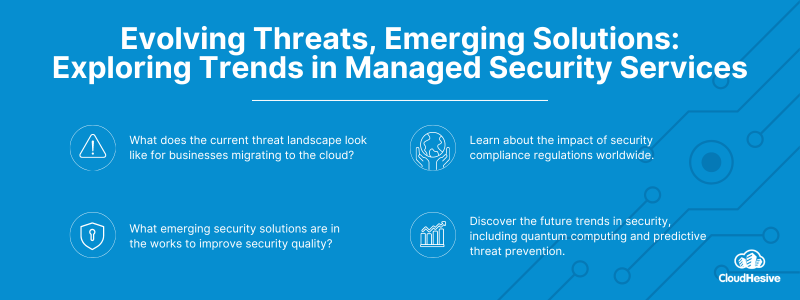Trends in managed security services
The managed security services industry is experiencing rapid growth due to the rise in the number of complex cybersecurity threats. The expansion of the threat surface, combined with enormous amounts of data and government regulations, equates to the perfect time for growth in managed security services.
Managed security services (MSS) include performing risk assessments, developing cybersecurity strategies, incident detection, response management, continuous security monitoring, and performing operational tasks to fully secure technology systems. The growth of security needs and continuing labor shortages for skilled security experts have made MSS the systematic approach for securing business assets. MSS can also provide essential security during an initial cloud migration or a digital transformation project.
This guide describes the current security threat landscape, emerging solutions, future trends, and security options for migrations.
The current threat landscape
Cybersecurity threats are dynamic and complex. Sixty percent of organizations have migrated to the cloud to take advantage of MSS. Organizations face security risks from ransomware, ongoing phishing attempts, and attempted data breaches.
Data is critical to business survival. The more it’s used for marketing and sales and to make business decisions using advanced analytics, the more it becomes a target for theft. Data security is important to business and is regulated by international and national restrictions that carry significant fines for non-compliance.
Businesses found to be careless with security not only pay millions in legal fees, but they’ll also pay for every record breached. US businesses involved in data breaches report losses from 4.45 million USD to 10.93 million USD for 2024.
The process of cloud migration poses specific security challenges because data and applications are transferred over a network. Keep in mind that the cloud is a set of distributed servers accessed over the internet. During a cloud migration, all business assets are wholly or partially moved to a cloud server. Quality MSS providers like CloudHesive implement procedures to continuously monitor security before, during, and after a migration.
MSS providers practice proactive risk management to detect any threats during the migration process. Post-migration, an MSS can address gaps or threats in security procedures and implement controls in cooperation with the business.
Emerging solutions in managed security services
MSS providers continuously invest in cybersecurity by keeping up with the latest threats and solutions. Additionally, they invest in security specialists, knowledge, and equipment. MSS providers can provide up-to-date security protection for:
- Endpoints
- Running AI vulnerability scans
- Logging and auditing transactions
- Monitoring the dark Web
- Performing ongoing system monitoring
- Tracking regulatory compliance
- Managing security incident response from incident to containment
MSS providers manage detection and response to proactively prevent and contain all security threats 24/7 every day of the year. There are new solutions that better manage identity data and access management systems. For example, a security command center is a way to organize a rapid response to any incidents for faster containment and damage control.
A security command center has the power to automate security activities while also training and preparing resources to respond to attacks. The goal is rapid response and containment by being organized, trained, and ready to act.
AI and ML are also being leveraged to track and monitor systems, searching for vulnerabilities and gaps in protection. Combined, each helps to not only track and identify security threats but also to predict how new threats will be created and when.
Integration of managed security services with cloud migration
When planning for a cloud migration, having a well-designed cybersecurity strategy is vital. This helps ensure your data and business assets are secured from the origin, during the transfer, and within the cloud.
You must also remain in compliance with a variety of regulatory requirements. With MSS provider CloudHesive, compliance audits are run continuously while processing migration workloads to ensure compliance throughout the entire process.
CloudHesive’s next-generation managed services model implements procedures for monitoring security and compliance, including creating a step-by-step process for secure cloud migration. Stakeholders can review dashboards in real time to gauge progress. CloudHesive practices proactive risk management, which uses advanced procedures and protocols to detect and respond to any threat.
Next, an MSS needs to assess current cloud security settings and ensure the business is fully covered and security is set properly. Remember, your cloud provider typically shares security responsibility with the business. The provider secures their system, and you need to properly secure yours. You’ll also need to ensure that you are compliant with a variety of regulations, including HIPAA, GDPRD, SOC, NIST, ISO, and PCI.
Future trends in managed security services
The future of MSS is predictive and proactive. Instead of security being largely a reactive or defensive process, security becomes proactive and predictive. This protocol anticipates potential vulnerabilities and closes them automatically. In other words, MSS security systems prevent threats before they materialize. By taking a proactive stance on security, businesses can best protect their assets.
MSS providers are making progress using ML and AI to provide predictive and proactive security. Additionally, government entities and businesses are working collectively on quantum computing technology to provide proactive security. Quantum computing boosts the power of cryptography and makes systems resistant to attack. MSS providers plan to use quantum-safe algorithms to provide continuous security protection.
Choosing the right MSS provider
Your business benefits from building a partnership with an MSS provider, but which one should you choose? Key factors to consider include:
- Expertise
- Industry knowledge
- Technology stack
- Customer service value
- Strength and quality of communication
You need an MSS with deep expertise in the technology you use and in the cloud. Industry experience is a plus. An MSS with a solid understanding of your business market helps build an effective plan.
You also need an MSS that communicates, which is key to building a long-term business relationship. Next is customer service quality. Make sure the MSS can provide you with the service level you want and need.
MSS provider CloudHesive provides your business with a dedicated cloud security and compliance team. We’ll help you design a security and compliance strategy based on your business needs. The team at CloudHesive serves your regulatory compliance and security needs now and into the future. CloudHesive compliance audits provide compliance evidence that can be communicated and detailed to any regulatory board.
CloudHesive provides you with:
- A step-by-step process to build and extend security and identity in the cloud
- Continuous monitoring to ensure compliance
- Proactive risk and security management
- Addresses any gaps or weaknesses in your cloud security setup and configuration
- Maintain cloud environments to ensure compliance
- Compliance certification mapping provided for HIPAA, GDPR, SOC, NIST, ISO, and PCI
Your business assets need the best security available. At CloudHesive, our security team is dedicated to ensuring your business assets are secured now, through a migration process, and once in the cloud. We’ll be there to help create a security strategy and implement it to ensure your business not only survives but thrives with top-tier support, communication, and proactive security practices. See what our customers say about working with CloudHesive. Don’t risk the security of your data; contact us today!




